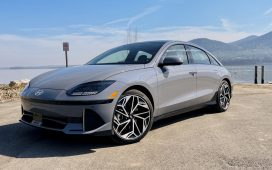Ford CEO Jim Farley accused the United Auto Workers of holding contract negotiations “hostage” over the company’s forthcoming electric vehicle battery plants. The UAW strike, which is now in its third week, expanded today to include more facilities, including those operated by Ford.
The strike comes amid a historically consequential shift in the auto industry away from gas-guzzling vehicles to battery-powered ones with zero tailpipe emissions. The automakers are spending billions of dollars to develop whole lineups of battery-powered vehicles, while striking autoworkers want assurances that the transition will use union labor.
Like other automakers, Ford is committed to investing tens of billions of dollars in the transition, including the construction of four new EV battery plants in Tennessee, Kentucky, and Michigan. Three of the four factories are joint ventures with a Chinese battery company, which has spurred Republican criticism of the storied automaker.
But just this week, Ford put one of those factories, a $3.5 billion EV battery facility in Michigan, on pause, citing labor costs and the potential for incentives from the Inflation Reduction Act (IRA) of 2022. Now, Farley said that the UAW is trying to use the battery factories as leverage in its negotiations with Ford — which he said doesn’t make sense in the context of this current contract.
“The UAW is holding the deal hostage over battery plants,” Farley said. “Keep in mind these battery plants don’t exist yet. They’re mostly joint ventures. They’ve not been organized by the UAW yet because the workers haven’t been hired and won’t be for many years to come.”
“The UAW is holding the deal hostage over battery plants”
As joint ventures, the battery factories will be managed by new entities created by Ford and its Chinese partners, CATL, and won’t be subject to the terms of a deal with UAW. But the UAW says the transition to electric vehicles needs to be “just” and powered by union labor. EVs are assumed to need fewer workers to assemble, fueling anxiety by union members about future jobs losses as more of Ford’s lineup becomes battery-operated.
But Ford said any concerns about job losses are misplaced. “None of our workers today are going to lose their jobs due to our battery plants during this contract period, or even beyond this contract,” Farley said. “In fact, for the foreseeable future, we will have to hire more workers, as some workers retire in order to keep up with the demand of our incredible new vehicles.”
The strike and the role of EVs has become a “political football” in recent weeks, Farley said, alluding to President Joe Biden and his likely rival former president Donald Trump making separate appearances in Michigan this week. Some Republican officials have questioned Ford’s deal with CATL over concerns about Chinese influence, which Farley said was a “shame.”
But the company’s decision to pause construction of its battery plant in Michigan was singled out by the UAW, with union president Shawn Fain calling it “a shameful, barely-veiled threat by Ford to cut jobs…. We are simply asking for a just transition to electric vehicles and Ford is instead doubling down on their race to the bottom.”
“None of our workers today are going to lose their jobs due to our battery plants during this contract period, or even beyond this contract”
Farley insisted the decision to pause the plant in Marshall, Michigan was not meant as negotiating tactic with the UAW. “We’re pausing to figure out what’s the right path forward,” he said. “There’s a lot of dependencies in deciding how big or how small that site should be. Labor costs, the final language of the IRA, and of course, whether we can secure a deal that allows us to invest in the products that those batteries are going to go into.”
Farley said the company is much closer to a deal with the UAW than it may appear, and that it was essential that whatever deal is reached is “affordable,” not just for Ford, but also customers, who could see the prices of electric vehicles rise as a result.
Some analysts have estimated that EV prices could go up as much as $5,000-per-unit if Ford were to accept the terms outlined by the UAW, which has called for cost-of-living increases of as much as 40 percent. But more recent counteroffers are lower, which should have less of an impact on EV prices, said Ford’s Kumar Galhotra.
“The deal that we are very close to is actually a deal that’s affordable for us,” Galhotra said. “It allows us to continue investing where we need to invest and it’s a very fair deal for the workers.”












